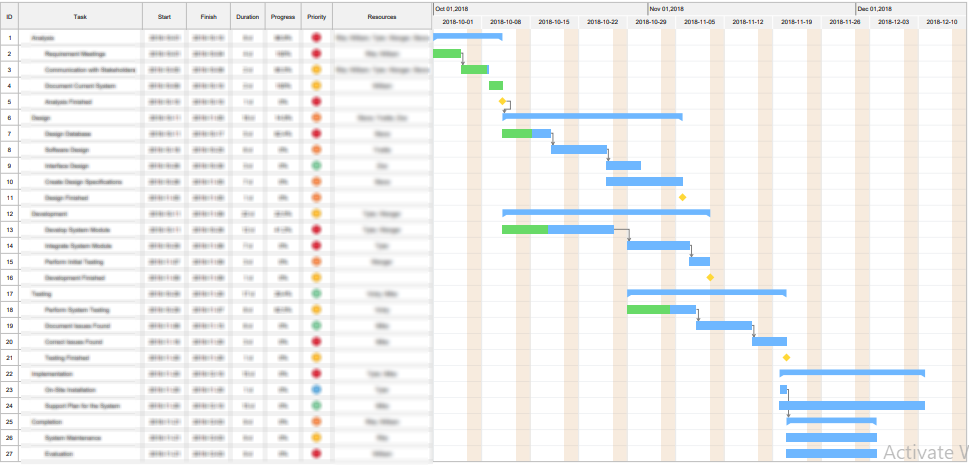
“By failing to prepare, you are preparing to fail.” – Benjamin Franklin
* * *
Last week, Garry Rodgers wrote a TKZ post about Leonardo da Vinci that explored the idea of using both sides of the brain: the left (analytical) and the right (emotional). Today’s post on project plans is all about the left side.
* * *
Let’s start with software. Software development projects are carefully planned and tracked. At least they should be. A large deliverable may involve many actors including developers, documenters, administrators, and testers. A good project manager will maintain a gantt chart much like the one pictured below (intentionally blurred), to document the various deliverables, dependencies, and milestones.

Gantt charts can contains hundreds of line items, so they’re a good way to keep track of everything. But there are pitfalls. Some project managers become so enamored with the bells and whistles of project planning software that they end up managing the plan rather than managing the project.
* * *
So what does this have to do with writing? Although writing is considered a right-brain function, the tasks that go into publishing a book are lefties.
My first book was traditionally published. Once the publisher offered a contract and I signed, they took the steering wheel. They had their own editors that I worked with. They also came up with several different cover designs for me to choose from. They purchased the ISBN and arranged for the copyright. They also decided on the release date and took care of uploading the book to the retail sites as well as Ingram Spark. I didn’t have a lot to do during that phase except ask some people for endorsements and review the situation whenever the publisher contacted me. There was no need for me to have a formal plan. But then things changed, and the rest of this post has to do with all the things that go into self-publishing a novel.
* * *
When my husband and I decided to self-publish the next book, we established our own publishing company, Wordstar Publishing, LLC. The process of publishing a book became a lot more difficult.
I started with a simple to-do list, and things went fairly well, but I only had one book to worry about. It soon became clear that I needed a project plan to keep track of all the threads.
So now I have a project plan for each book. I don’t use a gantt chart, but I maintain an excel spreadsheet with categories. Each category has a list of tasks and each task has a target date, completion date, and notes. Although I’m an avid follower of the KISS principle, there are well over a hundred line items on the plan for my latest book, and it will grow as I add book promos and feedback.
Here are the major categories and a brief description of each one:
- Writing / Editing – Everything it takes to get the ms ready for publication. Original ms, dev editor, revisions, line editor, proofreader, text to speech.
- Beta Readers – List of all the wonderful people whose feedback makes it a better book.
- Endorsers – More wonderful people who add credibility to the book.
- Cover Design – Work with the designer, finalize the image, provide back cover copy
- Copyright & Library of Congress – Get copyright and Library of Congress number. Send copies to gov agencies.
- Wordstar Publishing tasks – ISBN, barcode, contract with author
- Website – Update kaydibianca.com with book info
- Format and Finalize – Format in Vellum, finalize front and back matter
- Launch-related activities – Identify launch team, finalize emails, newsletters, images
- Prep for Pre-order and Final ebook – Choose ebook release date, prepare pre-order and upload to retail sites. Upload final version.
- Prep for Release of Print copy – Choose print release date for retail sites. Upload final version.
- Ingram Spark and Draft2Digital – Upload ebook and print to Ingram Spark. Upload to Draft2Digital for library distribution.
- Editorial Reviews – Identify and contact orgs for editorial reviews
- Marketing – Promos, giveaways, book store contacts
- Mail books – Send copies to all the folks who helped along the way
So there you have it. A way to keep organized and stay on-target.
* * *
Over to you, TKZers. How do you organize publishing your books? Do you maintain a project plan? What other activities do you track beyond what I have on my list?
* * *
 Cassie Deakin has one item on her to-do list: find out why two ex-cons attacked and almost killed her beloved uncle. But can she complete the task before she becomes the next victim?
Cassie Deakin has one item on her to-do list: find out why two ex-cons attacked and almost killed her beloved uncle. But can she complete the task before she becomes the next victim?
Lacey’s Star: A Lady Pilot-in-Command Novel.

Love your list! Launching an indie this month, so it’s timely! Thank you.
Good luck on your launch, Laura! What’s the title of your book?
Kay, I envy your organizational skill! Good info!
I used to keep similar charts to track magazine articles: market, editor’s contact info, subject, word count, deadline date, payment due date, the date payment was received. And sometimes, dates of collection calls to slow payers, along with a memo not to write for that magazine again.
How about doing a followup post with a project plan for marketing efforts? 😉
Good morning, Debbie.
That’s an interesting idea to create a project plan for marketing. I already have the first line item: cross your fingers. 🙂
Have a great week.
Oh, my left brain loves you!!! While I’m not Indie published I can see how this would help me as a Trad published author.
Actually, I’m entertaining the thought of going Indie…
Good morning, Patricia!
The traditional path is easier for the author, but I’m glad we made the decision to self-pub Dead Man’s Watch and the others after that. I like having the control over my work.
Sue Coletta recently switched from trad to indie. Maybe we can talk her into doing a post about her experiences for those who are considering it.
Have a great week.
My head hurts. Have to remember how to eat an elephant for this one.
Hi Terry. Everybody has to come up with their own way of doing things. When my checklists got scattered over pages in a notebook and post-it notes, I realized it was time to get organized.
Checklist? I’m supposed to have a checklist? Dang.
Wow, Kay, I don’t know how you do it all. I’m impressed with your list.
I do most of those things in a more informal way, but I like the way you organize your “to do” tasks. You gave me some new ideas.
Like, Debbie, I’d like to see your project plan for marketing.
Thanks for sharing your organization. Have a wonderful week!
Good morning, Steve!
I was working off of checklists and post-it notes for a while, but then I realized I could simplify my life by creating a plan.
I’m not sure I’m the best person to do a project plan for marketing, but you and Debbie have given me something (else) to think about.
Have a great week.
Very impressive and thorough list, Kay! I do checklists, starting with the current WIP’s writing stages, which include beta readers and copy editing, and then I’ll do a publishing checklist as the launch date draws nearer, but not a project plan. You’ve given us a great example of how to put one together this morning.
Thanks for sharing, and I hope you have a wonderful week!
Good morning, Dale!
A project plan is really just a checklist with dates. Having one is a stress-reducer for me. I’m less likely to forget something.
Have a wonderful week.
Kay, as a former project manager for industrial projects, I appreciate your method of managing all the moving parts. I’ve used gantt charts as well as PERT (program evaluation and review technique) diagrams which use arrows to indicate how upstream tasks feed into downstream dependent tasks, critical path and all that.
Question: When you set up your publishing LLC, did you consider the issue of where to establish it? I am at that point now. Home state is simplest but other states, such as Wyoming, offer greater privacy. There your business information is not available via a simple internet search for those who look for likely targets to make spurious legal claims. The court systems are being clogged with such things. Your information can be accessed with a court order but that is more of a deterrent and costly to the wolf pack. There are easier targets.
High value targets such as J. K. Rowling of Harry Potter fame are not the only vulnerable individuals. At least she had the financial wherewithal to slog through a decade long court case. But those starting out with thin financial resources can be hit with false claims and offers to settle for sums that lawyers will advise to just pay the ransom and move on. The court costs to defend would be far greater and time consuming.
Once an author is established and has the financial resources to fight back, they might be less likely to fall victim to such things. But then maybe not.
Perhaps my view of this subject is a result of the many years I spent in the company of corporate lawyers as we fought legal battles with other corporations. Exhausting work but at least it wasn’t my personal finances at stake then.
Good morning, Lars!
As a project manager, you know the value of organizing a complex project. Publishing a book is a lot less complicated than a large industrial deliverable, but I still find working off a plan to be a good idea.
We established our LLC in our home state of Tennessee. I can’t recall that we considered other options.
As far as the legal issues, James Scott Bell is better able to respond to those questions, and I hope he jumps in to address them. Btw, JSB’s book How to Make a Living as a Writer is a fantastic resource. I read it before we made our decision to self-pub.
Good luck. I’d like to hear what decision you go with.
This is a longstanding question that has no single answer for every situation. Let me suggest an article, and then a discussion with your tax person. No need to pull in a lawyer. Unless you’re planning a to write a roman á clef and skate across the ice of potential defamation or “invasion of privacy”, what are you worried about?
https://www.writersdigest.com/publishing-insights/when-should-writers-incorporate-or-create-an-llc
Thanks for the reference Dr. Bell. I’m a bit late to reply, but after reading the reference you provided, I needed time to thoroughly digest it.
I had to Google “roman á clef” and no I won’t be writing a tells-all with a key to who the characters represent in real life. I write more as Amy Tan and Donald Maass advocate, imbuing fictionalized accounts with experiences and emotions drawn from real life events.
An old family friend and lawyer gave me some good advice long ago. To the extent you can, don’t make yourself a target by making your private information and finances readily available to the wolf pack that roams about looking for easy prey. I realize being an author requires a fairly high level of public exposure. I will try to find a good balance point particularly in the early stages. Thus the Wyoming LLC not searchable via the internet.
“May you live in interesting times,” seems to be a blessing/curse visited upon me. Experience has made me cautious.
To wit, our baby sitter was taken by force from her home across the street. Her brother held the kidnappers at gun point. I called the police. Upon arrival they threatened me with arrest if I didn’t just shut up and go back inside my house. They threatened her brother with a brandishing of weapon charge if he didn’t just take his sister and go back inside their house. Seems the police were acting as the muscle for a drug gang that the DA was using to get info on other drug gangs.
Me thinks TV and movie cop shows lack realism.
But one of a seemingly endless stream of real life events I can draw upon for my writing.
I’m drinking the same Kool-Aid, Kay. 😀 Funny you post about project plans today. For the last several weeks, I’ve been organizing Crow Talons Publishing. When I bought back my rights in March, I quickly got overwhelmed with the task of republishing five novels while gathering a team (editor, cover designer, proof reader, street team, etc) to prepare to release the sixth. All of this craziness I kept in my head and Notes in my phone (no wonder I couldn’t sleep). By the time I released the eighth book in the series, I knew I had to find a better way to organize, not only my time but the to-do list.
To my surprise, I enjoy swapping my writer and publisher hats. I’ll add tracking streams of income, setting up ads, the CPC, the ROI, the A/B testing results, which creatives work better than others, monthly giveaways, stock, etc. etc. Without a firm grasp of this data, it’s easy to lose track of investment dollars and net profits. I also have a section for “writer related tasks” like when blog posts are due. If you blog on multiple sites, it’s important to keep track of those deadlines.
Good morning, Sue, and thank you for adding the info about tracking streams of income. “Without a firm grasp of this data, it’s easy to lose track of investment dollars and net profits.” Reminds me of that old adage “If you don’t measure it, you can’t manage it.”
Like you, I enjoy swapping my writing and publishing hats. It’s like exercise for the brain.
Have a great week.
Good luck with your new release.
Thank you Philip!
Good blog, Kate. I’m grateful my traditional publisher handles most of the hard work, but I still have to come up with a marketing plan.
Hi Elaine. Maybe you could share your marketing plan with us. There seems to be a demand for one. 🙂